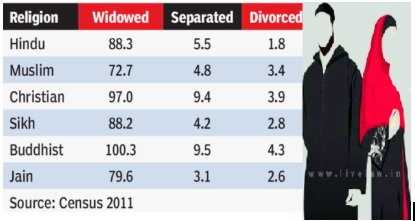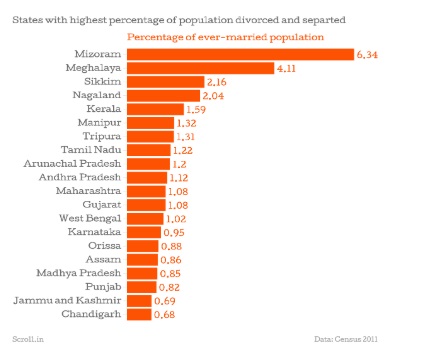In this article, Ninisha Aagrawal of RGNUL discusses Legal Rights of a Woman After Divorce.
Recently, on 11 September, Honorable Supreme Court cut down Cooling off period for Divorce by six months under the Hindu Marriage Act 1976 and ruled that divorce can be granted to couples without the provision of mandatory 18 month separation period. Bench of Justice Adarsh Goel and Justice Uday U Lalit held that the cooling off period of six months can be waived off by the courts with the mutual consent of the couples. Bench underlined that Section 13B enables the parties to dissolve the marriage by mutual consent if irretrievably broken down. Hence, it is not advisable to force the parties to accept matrimonial relation if they are unwilling to do so.
- According to 2001 census of Office of the Registrar General & Census Commissioner, India, under Ministry of Home Affairs, around 468,593 individuals got married, out of which 3,331 separated.
- Divorce statistics in different states according to 2011 census:

- The trend of divorce in context of various religions in India can be made understand through these statistics of 2011 census:

What are Maintenance Rights?
Maintenance means an amount which husband has to pay to the wife for the Divorce. The main aim is to provide financial independence to the divorced women so as to facilitate convenience. Section 125 of Criminal Procedure Court provides remedy to those who are neglected and seek maintenance. Only a legally wedded woman is considered as a “wife”.
What is an Interim Maintenance?
An interim maintenance is provided to the wife, in which an amount is to be paid from the date of filing of petition to the date of dismissal or decree. The aim of this allowance is to fulfill her basic needs during the pendency of the case.
What will be the Maintenance under Indian law?
According to Section 125(4) of the Code of Criminal Procedure, if both husband and wife are living separately with mutual consent, the wife cannot claim allowance from maintenance but a divorce decree by mutual consent to live separately cannot disentitle the wife to claim maintenance. The court can fix it at any amount, depending upon its discretion.
Can wife claim maintenance before divorce?
Firstly a divorce petition will be filed in a district court dealing with family matters. There are two conditions:
- Working women cannot claim maintenance before divorce or without separation.
- The wife has residence right till divorce, but no property right during lifetime of the husband.
Child Custody Rights
The custody of child in India depends upon the parents and religion. The custody of child in our country is governed by the personal laws of the religion practices with Guardians and Wards Act, 1890 which is applied to every citizen. While deciding the custody, the financial positions of the parents, background, lifestyle and welfare is taken into consideration.
Maintenance Rights under the Hindu Law
Right to maintenance is not a transferable right. A married woman can claim maintenance when she is living separately from her husband even if she is not seeking divorce under Hindu law alone. She is entitled to reside separately from her husband without forfeiture of her right to maintenance under Hindu Adoption Marriage Act, 1956. Sometimes it becomes impossible for a woman to reside with her husband but maybe she is not willing to break marriage relation because of personal reasons. So in that case, Hindu law provides certain grounds which are stated in the Act so as to claim allowance.
-
Grounds for awarding Maintenance are listed below
- Husband treated her with cruelty.
- Husband neglected her willfully or deserted her.
- Husband is suffering from any virulent leprosy or venereal disease.
- Husband has any other wife living.
- Husband keeps a concubine in the house or resides with that concubine somewhere else.
- Husband converted to another religion/ceased to be a Hindu.
- Insanity can also be a ground of divorce ( mental state and unsound mind)
- Presumption of death: If wife has not heard anything about the husband for at least seven years.
- Any other justification for separation valid in the eyes of law.
-
Additional Grounds of divorce
Wife has been provided additional grounds of divorce under Hindu Marriage Act of 1955 under section 13(2).
- Polygamous marriages.
- Bestial tendency of husband to rape, sodomize and torture.
- Repudiation of marriage.
- Maintenance order.
-
Limitations on the Act
▪If the wife has adulterous relationship with any other man during the lifetime of her marriage then she cannot claim anything.
▪If the wife has converted into any other religion and ceased to be a Hindu.
▪If there is no legal marriage or non-existent matrimonial relationship, then no claim is valid.
Note: As a result of Judicial Activism, presumption of Marriage is held as more significant and bar on maintenance had been removed.
Right to Ancestral property
A married woman has to be provided with shelter and maintenance by husband after the divorce. If she is a member of a joint family then she will be entitled to equal share of the husband, jointly with his mother and her children(after his death).
Child custody under Hindu Law
A Hindu child’s custody is decided according to Guardian and Wards Act, 1890 along with Hindu Minority and Guardianship Act, 1956 which also includes Jain, Buddhists and The Sikhs.
▪ According to with Hindu Minority and Guardianship Act, 1956 the Hindu child below the age of 5 years has to remain under the custody of mother so as to provide emotional and moral grounds.
▪The natural guardian is generally considered as father, otherwise mother.
▪If the custody of the father is not suitable for the welfare of the child, or not better than that of mother’s, then cannot claim any indefeasible right.
▪The custody of the child can shift from one to another, depending upon the welfare and secure future of the child.
-
Maintenance rights under Parsi Law
How to claim maintenance
- Parties can claim maintenance by instituting criminal or civil proceedings simultaneously.
- The religion of the party holds no significance in criminal matter but this is not so in the case of civil action.
What if Husband refuses to give maintenance?
- If the husband refuses to pay the maintenance even after the order of the court, then the wife shall approach the court.
- The court will imprison the husband until and unless he pays.
- The Parsi Marriage and Divorce Act, 1936 recognizes the right of the married woman to receive both pendent alimony and permanent alimony.
How claim is decided
- The maximum amount which can be claimed by the wife at the time of proceedings cannot exceed one-fifth of the husband’s income.
- The financial conditions of the husband, assets of the women and actions of the parties who are involved will be taken into consideration and it will remain in force till wife remains unchaste.
Click Here
Right to Ancestral property
Under the Indian Succession act, 1925, when the husband of a woman dies, then she will be entitled to one-third of the total amount of the ancestral property if there are other lineal descendants. but if there are no descendants, she half property will be given to her, otherwise, entire property.
Custody of Child under Parsi Law
It is dealt according to the instruction prescribed in Guardian and Wards Act, 1890. As the welfare of the child is of utmost importance and so, no custom or religious tradition can become an obstacle in the custody of the child
Maintenance rights under Christian Law
Maintenance is under which proceedings?
- Proceedings can be under either criminal or civil suit.
- Both criminal and civil proceedings can be carried out simultaneously. In criminal, religion does not matter, but in civil, it matters.
-
What if woman is not able to sustain herself after divorce?
Under Section 37 of the Indian Divorce Act 1869, divorced woman can get alimony from the husband till her lifetime by applying for maintenance in a civil/high court. But it is valid only for those who are Christian.
How to get alimony in case husband refuses
- If husband had refused to provide maintenance, then wife can approach the court, which in turn, can order the husband to make payment, provided that the court is satisfied with the veracity of statements.
- The alimony should not exceed one-fifth of the income of the husband’s average income for the next three years preceding the order and shall continue till decree of nullity or dissolution of the marriage.
- Court can also order the husband to make weekly or monthly payments to the wife, if reasonable, taking into consideration the financial situation of the husband at that point of time.
- Can order the husband to give maintenance to the trustee of the wife on her behalf.
Right to Ancestral Property
Under the Indian Succession act, 1925, when the husband of a woman dies, then she will be entitled to one-third of the total amount of the ancestral property if there are other linea descendents. but if there are no descendents, she half property will be given to her, otherwise, entire property.
Custody of Child Under Christian Law
It is governed by Indian Divorce Act of 1869 with Guardian and Wards Act of 1890. The court can pass direction either at the time of proceeding or after the decree for divorce, according to its discretion. Also, section 41, 42 and 43 of the act confers the power to the courts to decide the child custody of a Christian or any other child not covered under the personal laws.
Maintenance rights under Muslim Law
Which Act protects the rights of women under Muslim Law?
- The Muslim Women (Protection of Rights on Divorce) Act protects the right of women who have been divorced by their husbands.
- This Act was an outcome of the decision of Rajiv Gandhi Government to nullify the decision in Shah Bano case.
- It does not apply to Jammu and Kashmir. It is administered by the magistrate of first class exercising jurisdiction under Code of Criminal Procedure, 1973.
How this Act protects the right to maintenance of women?
- As per Section (a) of this Act, Muslim woman is entitled to receive alimony from her former husband under a fair and reasonable provision during the iddat period and the obligation of the husband is not only confined to that iddat period, but also after that time.
- In Shabana Bano v Imran Khan, Supreme Court held that a Muslim Women, who has no means of sustaining herself, can claim the maintenance even after the iddah periods gets over, according to Section 125 of CrPC.
- If a women is not able to sustain her livelihood after iddah period, which she observes after death of husband or divorce, during which she cannot marry any other man, then the magistrate can order the relatives of the woman to pay the maintenance to her but they will be entitled to inherit her property after her death, as per Muslim Law.
- But if relatives are not able to provide maintenance, then the magistrate can order the State Waqf to pay the amount.
NOTE: Muslim Women (Protection of Rights on Divorce) 1956 Act is retrospective in nature and husband will be liable to pay the maintenance (fair and reasonable provision) to the wife even if the divorce had taken place before passing the Act.
Case: Hyder khan v. Mehrunnisa (1993)
Ancestral Property rights of wife in Islam
In Shah Bano case, the Supreme Court held that, it is the responsibility of the husband during the divorce to make a reasonable and fair provision to maintain the former wife under Section 3(1Ha) of Muslim Women(Protection of rights on Divorce Act, 1986. The period extends beyond Iddat as the woman retains control over property and goods.
Custody of Child under Muslim Law
It is governed by the Guardian and Wards Act of 1890 but separate asct is not there. The custody of the child is known as Hizanat which means infant care.
▪ In case of a boy below the age of 7, mother holds the custody (according to Hanafi School)
▪In case of a girl, custody remains with mother till she attains majority or puberty.
▪If mother is not alive or incapable, then the custody is passed on to maternal relations of the child. If not possible, then finally to males.
▪After the attainment of age 7 of boy and puberty of girl, the father, who is considered as legal and natural guardian, gets the custody.
▪The rights of the custody can be forfeited from the mother if she marries someone not related to minor, neglects child, leads an immoral life or stays far from father’s residence.
In this article, several Acts have been discussed in sequence which paves the way for women in order to claim maintenance. Different religions operate under diverse laws but ultimately they all deal with the object of justice delivery and right of women.
Consult a good divorce lawyer for matrimonial disputes.
LawSikho has created a telegram group for exchanging legal knowledge, referrals and various opportunities. You can click on this link and join:
https://t.me/joinchat/J_
 Serato DJ Crack 2025Serato DJ PRO Crack
Serato DJ Crack 2025Serato DJ PRO Crack










 Allow notifications
Allow notifications



My dear fellow citizens,
The whole world is currently passing through a period of very serious crisis. Normally, when a natural crisis strikes, it is limited to a few countries or states. However, this time, the calamity is such that it has put all of mankind under crisis. World Wars 1 and 2 did not impact as many countries as have been affected by corona today. Due to this , people are staying at their homes and must be facing matrimonial issues related to their relationships ( be it husband or wife) .
So , to tackle such situation in a professional way along with protecting the rights of each other( Husband & Wife ) and to follow the correct procedure for the benefit of the each other , I would like to inform you guys that I m 24*7 available for your help . Feel free to reach me regarding your matrimonial matters .
Wish You Good Health
Thanks & Regards
RISHABH SETHI
( DIVORCE LAWS SPECIALIST)
SUPREME COURT OF INDIA & HIGH COURTS
MOB- 8077359032 , 9643139991.
EMAIL- [email protected]
This was an informative article. Makes for a good read on the subject entailed. Most people do not have clarity on the topics you wrote about. Will be quite helpful for them.
During the proceeding of divorce, if husband dies, how to get right to the joint property owned by husband and wife. Can the relative of the husband challenge it?
Whatever may be the constraints of higher courts in allowing habitual appeal over appeal by the cruel cunny husbands against the divorce decrees granted by the lower courts after thorough study of the case run for nearly a decade categorically explaining for grant of divorce on the petition by harrassed aggrieved wife ,exploiting the loopholes in the obsolete divorce laws framed hundred years back to his advantage to go on harrassing the hapless wife for long years in the process draining the poor wife mentally,physically and financially ,the higher courts once found that the husband filing these motivated appeals despite in no way he was affected or put to any sort of punishment in the form of payment of alimony or costs of case ,the higher courts would do justice to the aggrieved harrassed wife seeking freedom from the harrassment of husband even without any Alimony to her or her child( confirming the mental harrassment she had undergone coz of husband) by dismissing the 2 Nd appeal of the husband setting an excellent precedent to teach the cunny manipulative husbands/ advocates not to exploit the provisions made in law to appeal in genuine cases by perverted/ cunny/ mischievous husbands .This way only Higher courts could do their bit to accord justice to thousands of harrassed / exploited hapless wives in India
I found your article very informative and I totally love how the concepts are explained in this blog post. Thanks for sharing your insights. It helps a lot.
[…] A Christian woman cannot divorce her husband on the grounds of adultery, but that law does not include her husband. A divorced Christian woman is not entitled to property accumulated during the marriage, even if she contributed to acquiring it; she can only claim maintenance. […]